Washington is worried about a peace between Damascus and its estranged Arab neighbors — as well as Turkey — that is marginalizing the U.S. and its allies, writes M.K. Bhadrakumar.
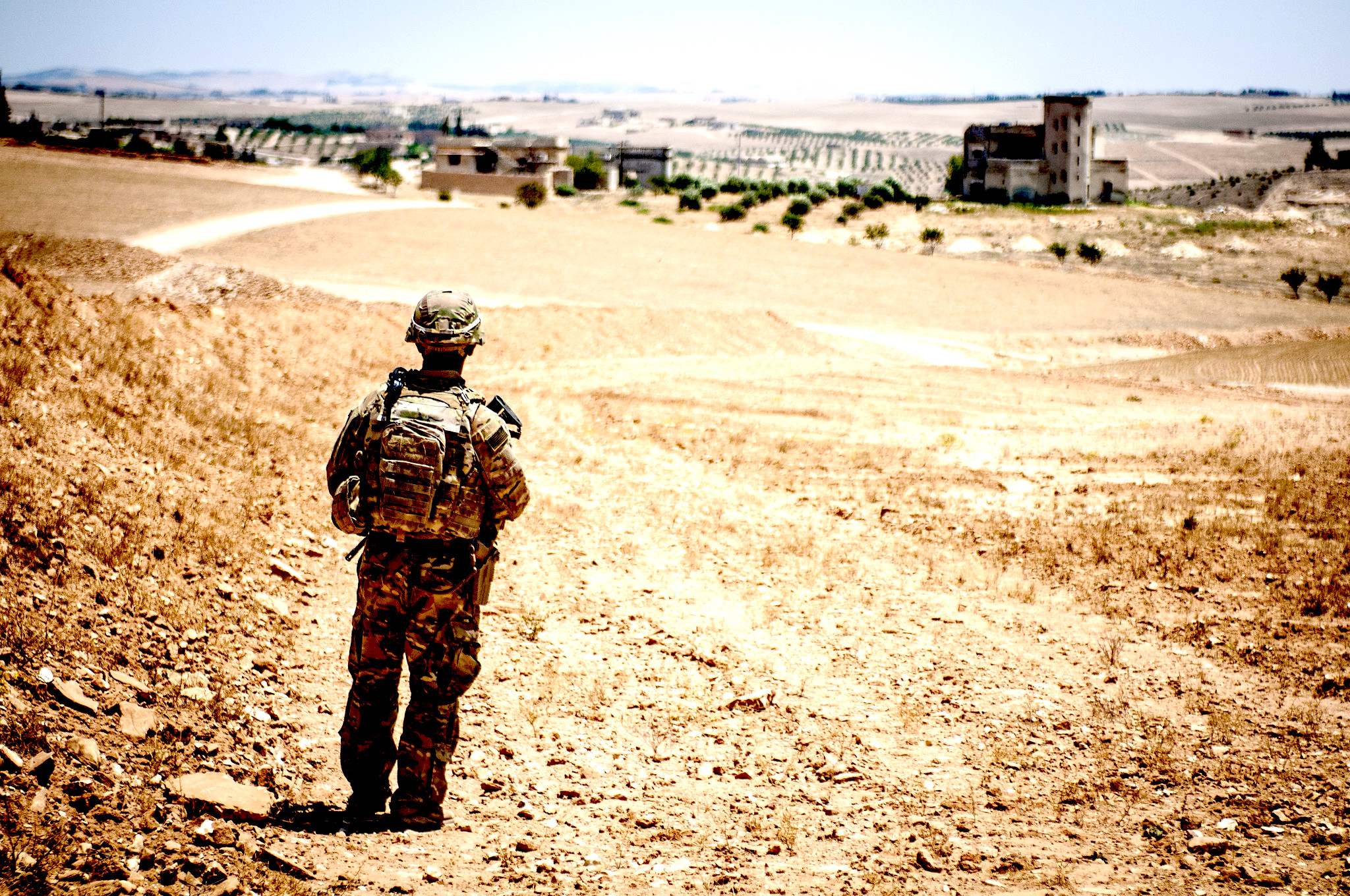
U.S. soldier in a patrol area outside Manbij in northern Syria, June 26, 2018. (U.S. Army/Timothy R. Koster)
By M.K. Bhadrakumar
Peoples Dispatch
 The circumstances surrounding the flare-up in Syria between the U.S. occupation forces and pro-Iranian militia groups remain murky. President Joe Biden claims that the U.S. is reacting, but there are signs that it is likely being proactive to create new facts on the ground.
The circumstances surrounding the flare-up in Syria between the U.S. occupation forces and pro-Iranian militia groups remain murky. President Joe Biden claims that the U.S. is reacting, but there are signs that it is likely being proactive to create new facts on the ground.
The U.S. Central Command claims that following a drone attack on an American base near Hasakah on the afternoon of March 23, retaliatory air strikes were undertaken later that night, at Biden’s direction, against “facilities used by groups affiliated with Iran’s Islamic Revolutionary Guards Corps.”
This version has been disputed by the spokesman of Iran’s Supreme National Security Council, however, who accused Washington of “creating artificial crises and lying.” The Iranian official alleged that “over the past two days, American helicopters have carried out several sorties with the aim of increasing instability in Syria, and transferred Daesh (Islamic State) terrorists in the territory of this country.”
He said Washington must be held accountable for such activities. The official warned that Tehran will give a prompt response to any U.S. attack, on whatever false pretext, against Iranian bases on Syrian soil, which are present at Damascus’ request to fight terrorism.
Is the U.S. deliberately ratcheting up tensions in Syria as the China-brokered, Saudi-Iranian rapprochement is radically changing the security scenario in the West Asian [Middle East] region in a positive direction?
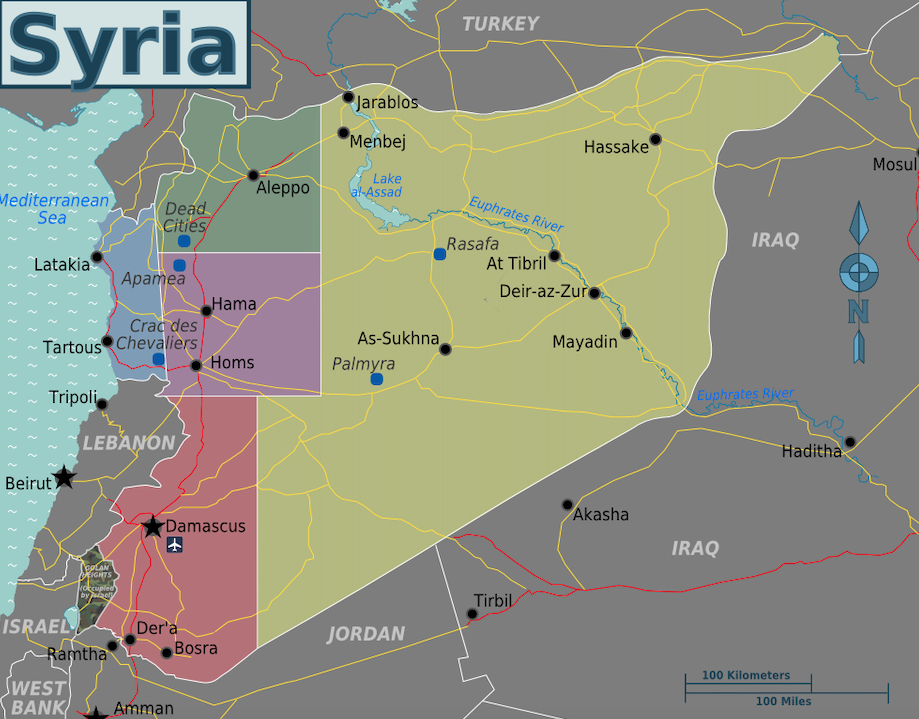
(cacahuate, based on map by NordNordWest, CC BY-SA 3.0, Wikimedia Commons)
Saudi-Syrian Talks
There is optimism that Syria stands to gain from the Saudi-Iranian rapprochement. Already, the Saudi Foreign Ministry has revealed that talks are going on with Syria for resuming consular services between the two countries, which will pave the way for the resumption of diplomatic relations, making it possible to reinstate Syria’s membership of the Arab League.
Saudi Arabia has established an air bridge with Syria to send relief supplies for those affected by the devastating earthquake in February.
The backdrop is that the normalization of relations between Syria and its estranged Arab neighbors has accelerated. It must be particularly galling for Washington that these regional states used to be active participants in the U.S.-led regime change project to overthrow the government of President Bashar al-Assad. The Saudi-Iranian rapprochement badly isolates the U.S. and Israel.
From such a perspective, it stands to reason that the U.S. is once again stirring up the Syrian cauldron as Russian aircraft have been reported to be frequently flying over the U.S. military base At Tanf on the Syrian-Iraqi border where training camps for militant groups are known to exist.
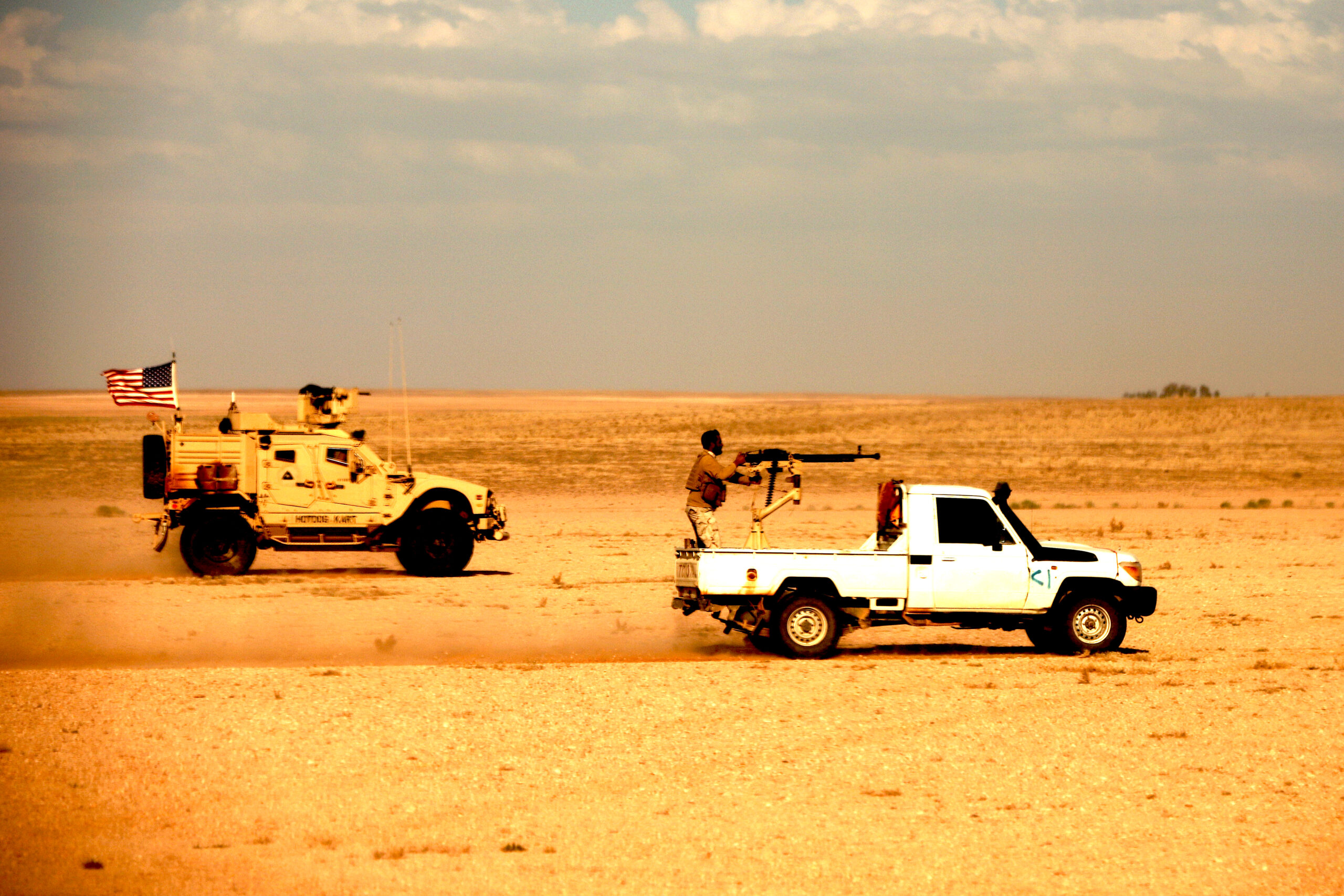
U.S. Green Berets and their partner force, the Maghaweir al-Thowra, MaT, during a joint patrol mission near At-Tanf Garrison, Syria, April 29, 2020. (U.S. Army/ William Howard)
Israel too is a stakeholder in keeping Syria unstable and weak. In the Israeli narrative, Iran-backed militia groups have been increasing their capability in Syria in the last two years and the continued U.S. occupation of Syria is vital for balancing these groups. Israel is paranoid that a strong government in Damascus might start challenging its illegal occupation of the Golan Heights.
A key factor in this matrix is the nascent process of Russian mediation between Turkey and Syria. With an eye on the forthcoming presidential and parliamentary election in Turkey in May, President Recep Erdogan is keen to achieve some visible progress in improving ties with Syria.
Erdogan senses that Turkish public opinion strongly favours normalization with Syria. Polls in December showed that 59 percent of Turks would like an early repatriation of Syrian refugees who are a burden on the Turkish economy, which has an inflation rate of 90 percent.
Ending Turkish Occupation Key to Assad
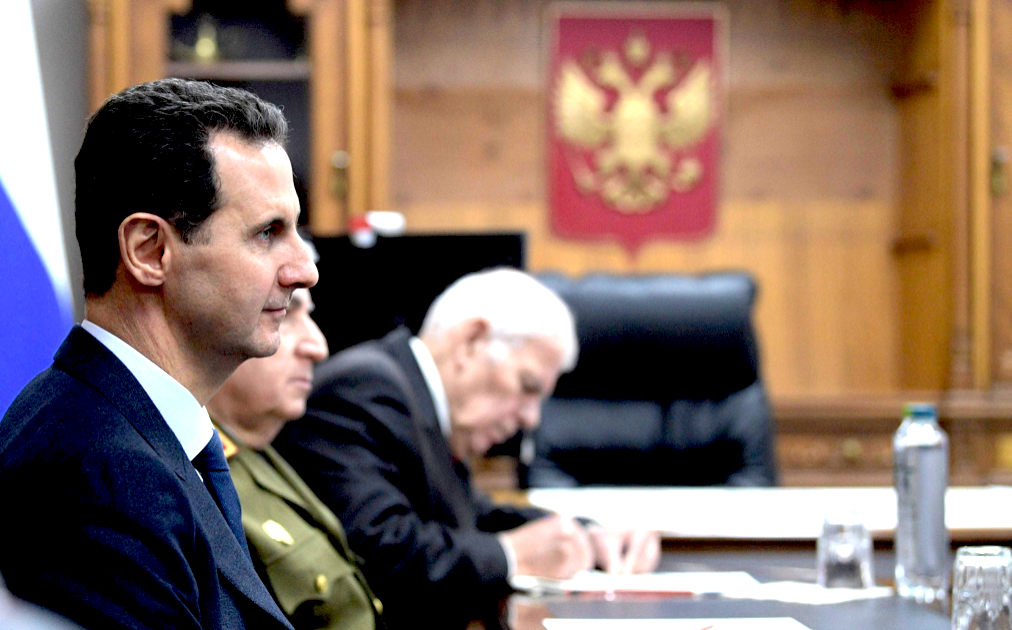
Syrian President Bashar al-Assad in July 2020, during a visit to Moscow. (The Kremlin)
Turkey is a straggler when other the West Asian countries are normalizing their relations with Damascus. But Assad is demanding the removal of Turkish occupation of Syrian territory first for resuming ties with Ankara.
Now, there are growing signs that Erdogan may be willing to bite the bullet. The consummate pragmatist in him estimates that he must act in sync with the public mood. Besides, the main opposition party CHP (Republican Party) has always maintained that an end to the Syrian conflict needs to be anchored on the principles of Syria’s unity and territorial integrity.
The influential Beirut newspaper Al-Akhbar has reported, citing sources close to Damascus, that Erdogan is weighing options that would meet Assad’s demand with a view to restoring relations. The daily reported that one possibility is that Turkey may propose a timetable for the withdrawal of its troops in Syria.
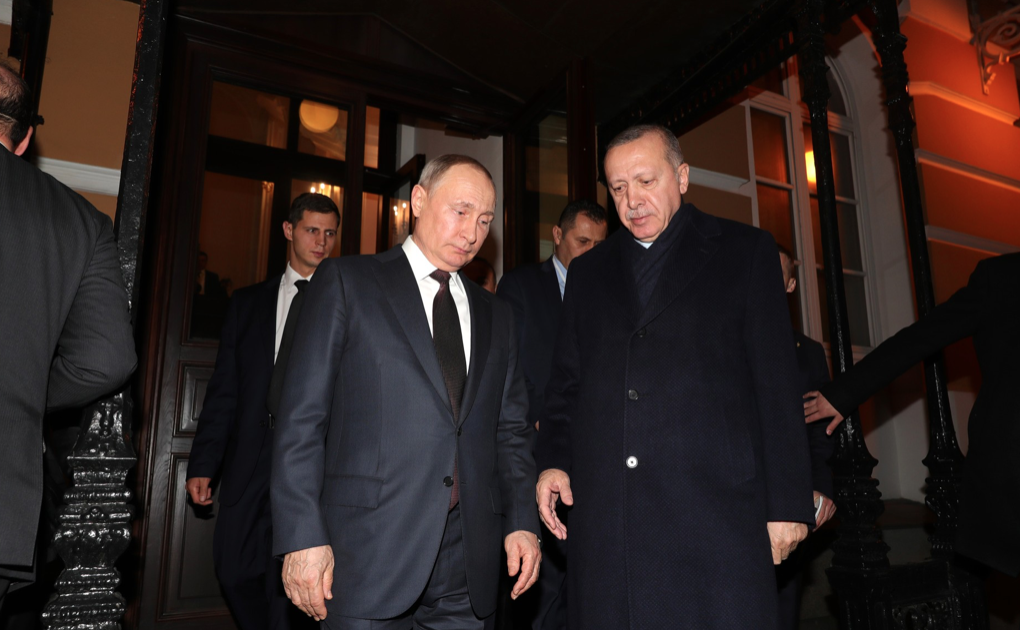
Russian President Vladimir Putin and Turkey’s President Recep Tayyip Erdogan following talks at the Kremlin, March 5, 2020. (Kremlin)
Significantly, Erdogan telephoned Russian President Vladimir Putin on Saturday and the Kremlin readout mentioned that amongst “topics concerning Russian-Turkish partnership in various fields,” during the conversation, “the Syrian issue was touched upon, and the importance of continuing the normalization of Turkish-Syrian relations was underlined. In this regard the President of Türkiye highlighted the constructive mediatory role Russia has played in this process.”
Earlier, last week, Turkish Defense Minister Hulusi Akar held telephone talks with his Russian counterpart Sergei Shoigu to discuss developments in Syria where he underscored that the “sole purpose” of its deployment in northern Syria is to secure its borders and fight terrorism.
It is entirely conceivable that Erdogan has sought Putin’s help and his intervention to reach a modus vivendi with Assad. Of course, this is a spectacular success story for Russian diplomacy — and for Putin personally — that the Kremlin is being called upon to broker the Turkish-Syrian normalization.
The China-brokered, Saudi-Iranian normalization hit Washington where it hurts. But if Putin now brokers peace between two other rival West Asian states, Biden will be exposed as hopelessly incompetent.
If Turkey ends its military presence in Syria, the spotlight will fall on the U.S.’ illegal occupation of one-third of Syrian territory and the massive smuggling of oil and other resources from Syria in American military convoys.
A reminder that US troops, illegally occupying a large swath of Syria, are still plundering its oil – depriving the government of *Syrian* resources needed to rebuild a country shattered by years of a US-fuelled proxy war and a devastating earthquake https://t.co/JW2yPBToP9
— Jonathan Cook (@Jonathan_K_Cook) March 26, 2023
Furthermore, Syrian government forces are sure to return to the territories vacated by Turkish forces in the northern border regions, which would have consequences for the Pentagon-aligned, Kurdish groups operating there.
The continued U.S. occupation of Syria may become untenable. Russia, Turkey, Iran and Syria are on the same page in seeking the withdrawal of U.S. troops.
Thus, the U.S. needs an alibi to justify remaining in Syria to fight “terrorism” when dialogue and reconciliation is in ascendance in West Asian politics.
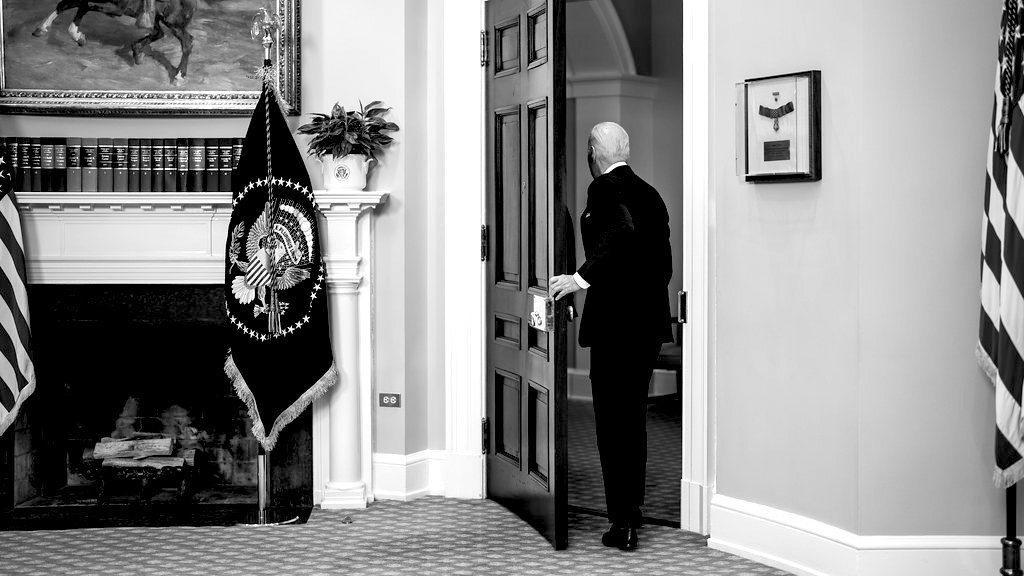
U.S. President Joe Biden after delivering remarks on a counterterrorism operation in Northwest Syria, Feb. 3, 2022. (White House/ Cameron Smith)
Washington’s intention could be to confront Iran on Syrian soil — something Israel has been espousing — by taking advantage of Russia’s distraction in Ukraine. The U.S. would also like to disturb improving Russian-Iranian ties.
The specter that is haunting Washington is that the stabilization of Syria following Assad’s normalization with the Arab countries and with Turkey will inexorably coalesce into a Syrian settlement that completely marginalizes the “collective West.”
In retrospect, the unannounced visit by General Mark Milley, chairman of the U.S. Joint Chiefs of Staffm, to northern Syria in early March falls into perspective. Milley told reporters traveling with him that the nearly eight-year-old U.S. deployment to Syria is still worth the risk.
The U.S. is vastly experienced in using extremist groups as geopolitical tools. The time may have come for the militants, including ex-Islamic State fighters, who were trained in the U.S.’s remote At-Tanf military base to return to the killing fields for “active duty.”
Tass reported that last Friday, the terrorist group known as Hayat Tahrir al-Sham tried to break into the Aleppo region which has been under Syrian government control and relatively stable in recent years.
MK Bhadrakumar is a former diplomat. He was India’s ambassador to Uzbekistan and Turkey. Views are personal.
This article is from Peoples Dispatch.
The views expressed are solely those of the author and may or may not reflect those of Consortium News.

Let us sing………
“My country tis I see, and of hypocrisy…”
None of that matters unless Syria, Russia, Iran, whoever is willing to forcibly remove the occupiers. If not the US can freely stay there for a hundred more years, as long as imperialist scum like Biden, Obama, Trump, Bush are in charge.
Syria’s oil and Russia’s natural gas, both leading to more money for America. While expounding on the virtues of a world order, these actions sound more like the actions of a crime syndicate.
Washington’s policies in the Middle East have long been aimed at creating divisions and fomenting strife amongst and within nations. That it has been able to do so successfully for so many years is a testament to Washington’s competence, not incompetence. However, now that the sands are shifting and the old policies no longer work, US policy-makers are at a loss for how to respond.
I am a U.S. citizen. I will be very pleased if my Country’s illegal occupation of Syrian land is ended. I would like to see all U.S. military personnel, together with the legions of “contractors” who infest U.S. bases, kicked out of all countries in the Middle East. There is no legitimate reason for them to be there. Iraq has demanded that all U.S. forces leave that Country and the U.S. refuses to do so. The world’s biggest thug has no respect for the sovereignty of other countries. I am disgusted with this arrogance and want my Country to transfer these forces home and put them to work doing something useful and legal for a change.
Ditto to all of the above.
Amen.
Actually, I think that “Washing is worried about peace” best sums up American foreign policy priorities. That puts America on the bottom rung in terms of its value to the world.
Washington doesn’t like peace because it can’t sell weapons to both sides, and it can’t exploit the situation to its own advantage, and it is generally bad for what a commenter here called the ‘crime syndicate’ of the US and western allies.
Fomenting and causing conflict and war is what the US is best at, even though it usually loses the wars eventually, but not before vast amounts of taxpayer money has been diverted to the warchest of the politicians, the military industrial complex, and other parasite organisations.
Essentially, the US and its warmongering allies have far too much of their economies dependent on wars.
What’s a brother gotta do to simply declare victory, and then finally leave the entire Middle East to its own curious cultural, ethnic, and religious devices?*
Asking for 1.7 million American soldiers, sailors, airmen, and marines who have their own dear skin in the game.
[*Same question, only for all of Africa and Eastern Europe, but to especially include Ukraine.]
Yankee go Home? Stop illegally occupying parts of the Middle East such as Syria & stop occupying other Countries that you have no business being in? America needs to get the hell out, like what they did in Afghanistan & stop stealing, looting, killing & Warmongering & turning these Nations into bombed out Hellholes that look like Detroit & start behaving like a normal Country again because the gig is up, your Empire is finished, so get out while you can before more US personnel get hurt!
US leaders are sad that peace and cooperation may break out in the world. Sad comment on them.
I agree with the writer that the timing of all these most recent incidents are strangely convenient for Washington and Israeli interests. Yankees should go home. Leave the Middle East to the Middle Easterners.